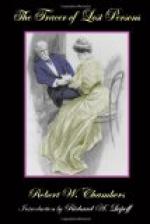And yet—and yet he had already spent a great deal of money in his brief quest, and—was he any nearer the goal—even with the penciled addresses of these two men in his possession? Even with these men almost within pistol shot!
Pondering there, immersed in frowning retrospection, the room, the Tracer, the city seemed to fade from his view. He saw the red sand blowing in the desert; he heard the sickly squealing of camels at the El Teb Wells; he saw the sun strike fire from the rippling waters of Sais; he saw the plain, and the ruins high above it; and the odor of the Long Bazaar smote him like a blow, and he heard the far call to prayer from the minarets of Sa-el-Hagar, once Sais, the mysterious—Sais of the million lanterns, Sais of that splendid festival where the Great Triad’s worship swayed dynasty after dynasty, and where, through the hot centuries, Isis, veiled, impassive, looked out upon the hundredth king of kings, Meris, the Builder of Gardens, dragged dead at the chariot of Upper and Lower Egypt.
Slowly the visions faded; into his remote eyes crept the consciousness of the twentieth century again; he heard the river whistles blowing, and the far dissonance of the streets—that iron undertone vibrating through the metropolis of the West from river to river and from the Palisades to the sea.
His gaze wandered about the room, from telephone desk to bookcase, from the table to the huge steel safe, door ajar, swung outward like the polished breech of a twelve-inch gun.
Then his vacant eyes met the eyes of the Tracer of Lost Persons, almost helplessly. And for the first time the full significance of this quest he had undertaken came over him like despair—this strange, hopeless, fantastic quest, blindly, savagely pursued from the sand wastes of Sais to the wastes of this vast arid city of iron and masonry, ringing to the sky with the menacing clamor of its five monstrous boroughs.
Curiously weary of a sudden, he sat down, resting his head on one hand. The Tracer watched him, bent partly over his desk. From moment to moment he tore minute pieces from the blotter, or drew imaginary circles and arabesques on his pad with an inkless pen.
“Perhaps I could help you, after all—if you’d let me try,” he said quietly.
“Dou you mean—me?” asked Burke, without raising his head.
“If you like—yes, you—or any man in trouble—in perplexity—in the uncertain deductions which arise from an attempt at self-analysis.”
“It is true; I am trying to analyze myself. I believe that I don’t know how. All has been mere impulse—so far. No, I don’t know how to analyze it all.”
“I do,” said the Tracer.
Burke raised his level, unbelieving eyes.
“You are in love,” said the Tracer.
After a long time Burke looked up again. “Do you think so?”
“Yes. Can I help you?” asked the Tracer pleasantly.




